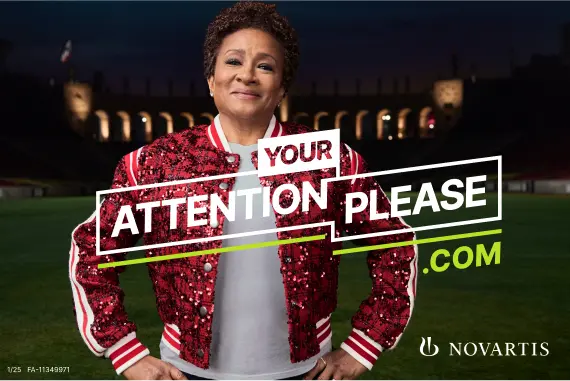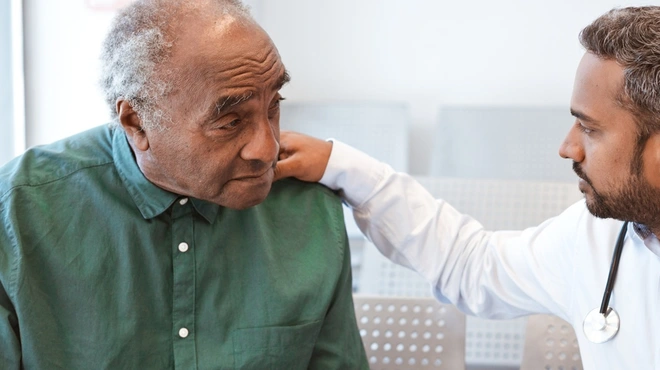When it comes to addressing the biggest health challenges we face today – from cancer to heart disease -- science alone isn't enough.
Against the backdrop of the Colorado Rockies, thought leaders, policymakers, and innovators gathered at Aspen Ideas: Health this week to discuss new ideas to transform healthcare.
Our Novartis leaders engaged in discussions showcasing the company's scientific breakthroughs—and shared something just as urgent: The story of our innovation that goes beyond the laboratory.
That story starts with confronting two of the most prevalent yet treatable cancers: Breast and prostate--and introduces a whole new approach to raising awareness about heart disease.
Many of the most devastating health challenges today are treatable when caught early. In fact, the statistics are heartening: Consider that, when it comes to heart disease, prevention may be possible. An estimated 80% of cardiovascular disease, including heart disease and stroke, may be preventable by addressing certain risk factors through lifestyle interventions and treatment.1
Also, if breast cancer is caught early, patients have over a 99% survival rate.2
Yet millions of Americans face barriers to screening and care that innovation alone can't solve. Here are three innovative ways we’re working to reach them and raise awareness.
1. Shifting Care from Reactive to Proactive
During the “The Next Frontier of Cancer" panel, Rodney Gillespie, Senior Vice President of US Therapeutic Area Head Oncology at Novartis, joined leading experts to explore the frontiers of cancer treatment and detection.
“The science is moving fast. We’re diagnosing cancer earlier, treating it more precisely, and helping people live longer,” said Gillespie. “But to truly shift outcomes, we must reach people long before they walk into a clinic. Scientific advances continue to push boundaries, but ensuring broad access to these innovations remains the ultimate challenge.”
It’s true when it comes to treating heart disease, too: “Despite many innovative and effective treatments, it’s concerning that in the cardiovascular space, we are only reaching a third of people who could benefit from them,” says Dianne Auclair Rocha, Senior Vice President, US Therapeutic Area Head, Cardiovascular, Renal and Metabolic at Novartis.
For Novartis, addressing that challenge means showing up in Superbowl ads to stress screening and early detection, as well as community centers and trusted neighborhood spaces to raise awareness with at-risk communities, partnering with new allies, and launching bold campaigns to encourage prioritizing your health.
Our approach is about sparking conversations in the real world that help promote proactive health.
2. Promoting the Power of Screening and Knowing Your Risk
Women are busy. They juggle careers, families, and countless responsibilities, often putting their health last. When it comes to breast cancer screening, this tendency can be life-threatening: In fact, 1 in 2 women don't get their annual breast screenings, which can catch cancer early, when it's most treatable. "Your Attention, Please" is our bold breast health awareness campaign that breaks through the noise of daily life and reminds women to get screened by inviting them to sign up for email alerts.
The campaign launched at the Superbowl this year with the support of several patient advocacy partners in breast cancer, has the goal of translating awareness into action. And, through engagement with the Alliance for Breast Cancer Policy, Novartis is going further to lobby for improved coverage for more comprehensive diagnostic testing, removing financial barriers that prevent women from accessing the care they need.
Men also face challenges when it comes to early cancer detection, especially in communities where stigma, silence, or lack of access stand in the way.
Real progress happens when we break down silos and work together across communities and sectors,” - Binta Beard, Head, US Social Impact and President, Novartis US Foundation
Through our partnership with ZERO Prostate Cancer, Novartis is expanding access to care and working to improve outcomes for communities most affected by prostate cancer. The three-year landmark initiative empowers these communities with education, patient support, and advocacy, meeting people in their familiar spaces.
These programs don’t happen in a vacuum. They rely on partnerships, and at Aspen Ideas: Health, collaboration was the focus of a powerful roundtable conversation we were proud to lead.
3. Our Unique Approach to Community Empowerment
During Novartis' private breakfast discussion, "Better Together: Exploring Effective Strategies for Multi-Sector Collaboration to Meaningfully Advance the Health of Communities," Binta Beard, Head, US Social Impact and President, Novartis US Foundation, facilitated a crucial conversation about what it takes to drive change in underserved communities.
“Real progress happens when we break down silos and work together across communities and sectors,” said Beard.
The discussion reinforced that addressing health disparities requires partnerships that cross traditional boundaries. It means bringing together patient advocacy groups, healthcare providers, health systems, academia, communities, and forward-thinking companies to co-create solutions that matter to people and society.
In Baltimore, our engAGE with Heart initiative works directly with community organizations to address cardiovascular health disparities. The strategy is simple: We go to them. Novartis works with partners with deep roots and established trust, creating systemic change from within.
For Faith Metlock, a Johns Hopkins Ph.D. student and engAGE with Heart volunteer, the work is personal. On Sundays at Mount Pleasant Church in Baltimore, Faith joins a team of volunteers offering blood pressure and cholesterol screenings right after the gospel choir finishes their last hymn. She greets congregants by name, laughs with them over food choices, and asks questions that might help flag early signs of risk. It’s a health outreach layered with dignity, joy, and trust.3
"We were partnering with churches in the community, and designing a program with the people, something that was sustainable,” says Metlock. “Something that they had their input on and that really addressed their identified needs.”
In the end, redefining the future of healthcare means recognizing that our science doesn't stop in the lab. It extends into communities, conversations, and trusted spaces where real change happens.
At Aspen Ideas: Health 2025, that's the story Novartis came to tell and the work we're committed to continuing long after the mountain air clears and everyone returns home.
_______________
Caleigh Findley is a Colorado-based science writer specializing in research and health communications. She holds a doctorate in pharmacology and neuroscience.





